|
PENTECOST
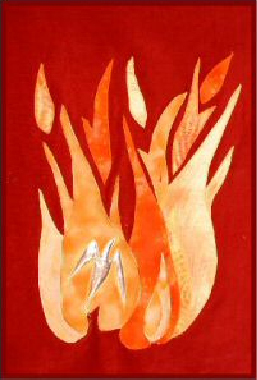
Sunday, June 12, 2011
(Enjoy the wonderful and informative videos below.)
Writer for This Unit: Luke Powery, Lectionary Team Member
The unit you are viewing, Pentecost, is a compact unit. This means that it does not have a supporting cultural resource unit and worship unit. Instead, to enliven the imagination of preachers and teachers, we have provided scriptural text(s) that we suggest for this moment on the calendar along with a sermonic outline, suggested links, books, articles, songs, and videos. For additional information, see Pentecost in the archives of the Lectionary for 2009 and 2010. 2011 is the first year that the African American Lectionary has posted compact units for moments on its liturgical calendar.
I. Description of the Liturgical Moment
Pentecost comes from the Greek word pentekostos, which means 50th. It is the Mosaic festival observed by Jews, Shavuoth, sometimes called in the Old Testament the Feast of Weeks (Exodus 34:22; Leviticus 23:15; Numbers 28:26; Deuteronomy 16:9-12). Other names for the day are the Feast of the Harvest and Day of First Fruits (Exodus 23:16; Numbers 28:26).
Pentecost is 50 days after Easter in the Christian liturgical calendar. It is the day in which the church commemorates the descent of the Holy Spirit on the disciples after the resurrection and ascension of Jesus (Acts 2). On that day, “a tongue rested on each of them” (Acts 2:3) such that each spoke different languages inspired by the Spirit. The gift of the Spirit is a gift of speech for the whole community of believers. Everyone on this day spoke of “God’s deeds of power” (Acts 2:11). The presence of the Spirit led to the proclamation of God.
Thus, on this Sunday, linguistic gifts given by the Spirit are expressed through God’s people in spoken and sung word in diverse ways. The Spirit may rest on all so that everyone has something to proclaim aloud. No one is left out from being divinely touched and giving voice to the power of the Spirit. The Holy Spirit is emphasized to such an extent that this Sunday is in fact not just a commemoration but a rededication and liturgical supplication for the ongoing presence of the Spirit in individual lives and the faith community. Churches may sing in good Pentecostal fashion, “O Lord, send the pow’r just now, O Lord, send the pow’r just now, O Lord, send the pow’r just now, and baptize everyone.” Pentecost services are liturgical “upper room” spaces where congregations are hopefully on one accord as they wait for the fire of the Spirit and perhaps pray musically, “Spirit of the living God, fall afresh on me.”
The theme of Pentecost fits right into the framework of black religion because as W. E. B. Du Bois reminds us, Africans brought “a gift of the Spirit”1 to the Americas during the holocaust of slavery. Others have noted that there is much love of the Spirit in the Black Church. One of the obvious ways the Spirit has worked historically through black people is via spirit possession.
In the Pentecostal church of my youth, I saw people “filled with the Holy Ghost.” When the Spirit rested on them, they spoke in tongues, shouted, gyrated, danced, and expressed the presence of God externally. This matched the traditional understanding that “if you got religion, show some sign.” However, not everyone experienced the Spirit in this manner, and some wondered what the shout was all about, even causing one person to say of a shouter, “They must think God is deaf.” Or, someone else might think that they were less spiritual because they weren’t “filled” in the same ecstatic way.
The Spirit resting on people does not create a uniform experience, nor is there formal agreement about the manifestations of the Spirit in Christian communities. Similar to the day of Pentecost, when there were different languages spoken, there are different ways the Spirit manifests in and through individuals for the glory of God; this has been referred to as a diversified unity. The point is that when we sing “Spirit of the living God, fall afresh on me,” we cannot be definite about what that refreshing will look like, but the hope is that this musical prayer would be on the lips of all.
With this backdrop in mind, the following sermonic outline is offered for Pentecost 2011.
II. Pentecost: Sermonic Outline
A. Sermonic Focus Text(s): Numbers 11:24-30 (New Revised Standard Version)
(v. 24) So Moses went out and told the people the words of the Lord; and he gathered seventy elders of the people, and placed them all around the tent. (v. 25) Then the Lord came down in the cloud and spoke to him, and took some of the spirit that was on him and put it on the seventy elders; and when the spirit rested upon them, they prophesied. But they did not do so again. (v. 26) Two men remained in the camp, one named Eldad, and the other Medad, and the spirit rested on them; they were among those registered, but they had not gone out of the tent, and so they prophesied in the camp. (v. 27) And a young man ran and told Moses, ‘Eldad and Medad are prophesying in the camp.’ (v. 28) And Joshua son of Nun, the assistant of Moses, one of his chosen men, said, ‘My lord Moses, stop them!’ (v. 29) But Moses said to him, ‘Are you jealous for my sake? Would that all the Lord’s people were prophets, and that the Lord would put his spirit on them!’ (v. 30) And Moses and the elders of Israel returned to the camp.
B. Possible Titles
i. What if Everybody Had the Spirit?
ii. I’ve Got the Spirit
iii. Has the Holy Ghost Got You?
C. Point of Exegetical Inquiry
Many people in our pews and even some in the pulpit speak of the Holy Spirit as only a New Testament concept even though most Black Christians are highly Trinitarian. Although the Spirit rested on all of the disciples at the day of Pentecost (in the New Testament), in the Old Testament in our text for today, Moses yearns for the Lord to put the spirit on all of God’s people (v. 29). Why? Moses cannot carry the burden alone of leading the children of Israel in the wilderness (11:14, 17). He realizes that he can’t be the only one on whom the Spirit rests. Leading this motley crew of God’s children is too much for him. God knows how much Moses can bear so God promises to “take some of the spirit that is on [him] and put it on [the seventy elders of Israel]” he will gather (11:17). This way Moses will not have to “bear the burden of the people” (11:17) alone but will have co-bearers.
God fulfills God’s word so when the seventy elders gather, the Lord comes in a cloud and “took some of the spirit that was on [Moses] and put it on the seventy elders; and when the spirit rested upon them, they prophesied” (v. 25). Throughout the Scriptures, the Spirit is connected to prophecy (cf. Acts 2:17-18). This passage is no different (vv. 25, 26, 28), as the gift of the Spirit is linked to the gift of speech. Something happens when the Spirit rests on people. Pneumatology, the doctrine of the Spirit, is interwoven with human activity. In this situation, the elders prophesy when the Spirit rests on them. The same thing happens to Eldad and Medad when “the spirit rested on them”—“they prophesied” (v. 26). Not everyone in Israel’s camp was happy about this (vv. 27-28), but Moses has a different reaction because of his leadership role in the community.
The Spirit’s presence was not just about ecstatic prophesying but it was also about the endowment of authority for leadership in a community, particularly Israel. The elders prophesied once they received the Spirit but “this prophesying endowed the elders with the distinction of Mosaic authority.”2 The Spirit validates and authorizes other leadership in this community to help Moses bear the burdens he carries. God provides, by the Spirit, what the people need in a given moment. At this juncture, Moses needs assistance and this is what God signifies through the resting of the Spirit on others. The Spirit is the source of gifted proclamation and authoritative leadership, but all of this is to aid a community of people.
III. Introduction
The Spirit rests on others to help a community. Moses recognizes this so he declares, “Would that all the Lord’s people were prophets, and that the Lord would put his spirit on them!” (v. 29). He yearns for the Spirit to rest on all because the Spirit’s presence is not limited to a few good men or women. The Spirit is for all. In his mind, the more the merrier because then he would not have to bear the burden of prophetic leadership alone. No one has a prophetic monopoly on God. And if the human community is to flourish like God desires, then ministerial collaboration is needed. All need to be prophets and have the Spirit rest on them because this will support the community. Moses would not be alone or burdened down with the troubles of the world if the Spirit rested on all.
If the Spirit rested on all, there would be real Christian community and not cults of preacher personalities. The burden of a community would be on the community and not on one charismatic leader whom others perceive to be the only one with gifts of the Spirit. The Spirit can rest on all. If the Spirit rested on all, everyone would play their part in bettering the community. If the Spirit rested on all, there wouldn’t be a crisis of leadership in the black community or a “crisis in the village.”3 If the Spirit rested on all, the burdens might be a little lighter and life a little brighter. So like Moses, the church should declare, “Would that all the Lord’s people were prophets, and that the Lord would put his spirit on them!” We don’t have to be jealous of the spiritual gifts of others and try to “stop them!” (v. 28). Rather, we should rejoice that the Lord still blesses his people with Holy Ghost power. That should make us pray that God would take some of the Spirit that was on Moses and put it on us!
IV. Moves/Points
Move/Point 1 – Leaders Need Spirit-filled Followers
a. Moses needs help to lead the Children of Israel;
b. We must all be co-laborers in the Spirit to change the world; and
c. Spirit-filled leaders can prophesy.
Move/Point 2 – Having the Spirit Gives Authority
a. Spirit-filled leaders have the authority to lead;
b. Spirit-filled leaders bear the burdens of others; and
c. Spirit-filled leaders have the authority to provide uplift to communities.
Move/Point 3 – What If the Spirit Rested on All Christians?
a. If the Spirit rested on all, we would get rid of preacher cult figures;
b. If the Spirit rested on all, all Christians would help the Kingdom come; and
c. If the Spirit rested on all, the day of Pentecost would return again and again.
V. Celebration
The Spirit will rest on us and make us prophets of God. We don’t have to bear our burdens alone because the Spirit will come and give us what we need as a people. God promised it and God fulfills God’s promises. So the Spirit will rest on everyone. When the dove rests on us, there is true community. O Lord, send the power just now. Anointing fall on me. Let the power of the Holy Ghost fall on me! Fall on me. Fall on me. Lord, let the Holy Ghost fall on me. If you let the Holy Ghost fall on me: I’ll walk right; I’ll talk right; I’ll live right; I’ll give right. Lord, let the Holy Ghost fall on me. Fall on me. Fall on me. People are dying; children are crying; families are lost. Lord, what’s the cost? Lord, let the Holy Ghost fall on me. Fall on me. Fall on me. Lord, let the Holy Ghost fall on me. If you let the Holy Ghost fall on me: I’ll walk right; I’ll talk right; I’ll live right; I’ll give right. Lord, let the Holy Ghost fall on me, right now.
VI. Illustrations
The Out of Sight Kite
One day a little boy was flying his kite high, out of sight, in the sky. A man passing by asked the boy, “Son, are you flying your kite?” The boy responded, “Yes Sir!” The man replied, “I don’t see a kite. Are you sure it’s up there?” The boy replied, “Sir, I know it’s up there because every now and then I feel it pulling on the string.”
Although we cannot explain the presence of the Holy Ghost in our lives, every now and then we can feel Him pulling and moving in our hearts and hear Him speaking to our lives.
— Anonymous. Several versions of this illustration exist.
Burned Trying to Recreate the Burning
It is said that Leonardo da Vinci tried to reproduce Pentecost. He got a group of actors to be his disciples. He had the wind blowing, and fire falling from the roof. Things went haywire. The drapes caught fire, several actors were burned, and the building nearly burned down. You can’t manufacture the power of the Holy Ghost.
— Emery Lindsey, “Go Out in the Power of the Spirit,”
The African American Pulpit (Winter 2005–2006), p. 35
A Bad Decision Blocker
CNN reported that T-Mobile just produced a new phone with a special feature called a Bad Decision Blocker. The bad decision blocker is a new feature which, after you program particular numbers into your phone, prohibits you from making the bad decision of calling someone you do not want to call. It will block your calls for up to a month. As I thought about that feature I wished life had a bad decision blocker. I wished we had something to stop us from making decisions we will regret later. But, after thinking for a few minutes more, I realized Christians do have a bad decision blocker. It’s called the Holy Spirit.
— Reginald Bell, Jr., Memphis, Tennessee
These illustrations were taken from the Sermon Illustrations section of The African American Lectionary.
VII. Sounds, Sights and Colors in This Passage
The sounds, sights, and colors in this passage include:
| Sounds: |
Moses tell the people the words of the Lord; God speaking to Moses; the elders prophesying; Eldad and Medad prophesying; a young man speaking to Moses; Joshua telling Moses to “stop them”; Moses’ words to Joshua;
|
| Sights: | Moses going to speak to the people; the 70 elders gathered around the tent; the Lord arriving in a cloud; the Lord taking some of the spirit that is on Moses and putting it on the elders; Eldad and Medad in the camp; a young man running to Moses; the elders going back to the camp; and
|
| Colors: | The color of the clothing worn by Moses; the beige tent with brown poles; the white cloud; the clothing worn by the people as they listened to the prophesies; and the colors of the trees and soil in the wilderness.
|
VIII. Songs to Use to Accompany This Sermon
A. Hymn(s)
- Spirit of the Living God. Text and Tune, (IVERSON), by Daniel Iverson

- Let It Breathe on Me. By Magnolia Lewis-Butts
- Sweet, Sweet Spirit. By Doris Akers

This is a good instrumental version of this classic.
B. Well Known Song(s)
- Real, Real, Jesus Is Real to Me. By Beatrice Brown
Enjoy this old-school version of “Jesus Is Real to Me” by the Sallie Martin Singers and Brother Joe May.
- He Touched Me. By William Gaither
- The Presence of the Lord Is Here. By Kurt Carr

- When the Fire Fell. By G.E. Patterson
C. Modern Songs (Written between 2000 and 2010)
- I Can Only Imagine. By Bart Millard
- Lead Me, Jesus (Remix). By Gregory O’Quin
- The Spirit of David. By Fred Hammond
D. Songs for the Period of Prayer
- Speak to My Heart. By Donnie McClurkin
- Holy Ghost Power. By Percy Gray, Jr.
E. Invitational Song(s)
- Holy Spirit. By Richard Smallwood

- Send the Holy Ghost. By Kurt Carr
IX. Helpful Videos, Audios, and/or Interactive Media
In 2008 Regents University presented a series of lectures on Pentecostal Charismatic Christianity, which many believe is the fastest-growing segment of the African American Church. Since current scholarship on black Pentecostalism lags behind research in other areas of the movement, however, much of its contribution remains unknown. Lecturers for 2008 included: Drs.: Leslie Callahan, Clarence Hardy, Cheryl Sanders, and Leonard Lovett, respectively, as shown below. For complete information on the colloquium, visit their website at http://www.regent.edu/acad/schdiv/newsandevents/afropentecostalism_colloquium.shtml
X. Books and Articles to Assist in Preparing Sermons or Bible Studies Related to Pentecost
- See the 1977 article by John Derek Norvell, “The Pinskster Celebration: An African-American Pentecost” for an intriguing African American celebration. “The holiday’s name is derived from the Dutch term for Pentecost “pinkster/dagh,” although it is closer in form to “pfingsten tag” of the neighboring German Lutheran religions,” writes Norvell. Online location: http://aainnovators.com/Archives/Articles/Derek%20Norvell%20-%20Pinkster%20Article.htm accessed 30 January 2011
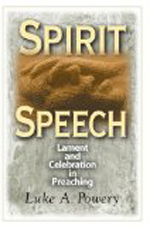 |
For a perspective on thinking about the Spirit and human speech in preaching, see Powery, Luke A. Spirit Speech: Lament and Celebration in Preaching.Nashville, TN: Abingdon Press, 2009.
|
 | For further reflection about the Holy Spirit in preaching, see Forbes, James. The Holy Spirit and Preaching.Nashville, TN: Abingdon, 1989.
|
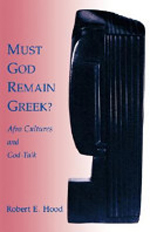 | For a broader understanding of the work of the Spirit in black cultures, see Hood, Robert E. Must God Remain Greek? Afro Cultures and God-Talk. Minneapolis, MN: Fortress Press, 1990.
|
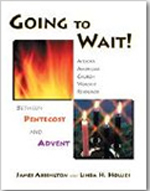 | Abbington, James and Linda Hollies. Going to Wait: African American Church Worship Resources Pentecost through Advent. Chicago, IL: GIA Publications, 2003.
|
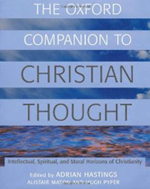 |
Hastings, Adrian, Alistar Mason, and Hugh Pyper, eds. The Oxford Companion to Christian Thought. New York, NY: Oxford University Press, 2000. See a brief definition of Pentecost. This hefty (808 pages) book is a good tool for information on many days on the Christian liturgical calendar.
|
XI. Links to Helpful Websites for Pentecost
- “Being,” NPR Radio Show—For an interesting discussion of Pentecost and Pentecostalism, see the video from the NPR radio program “Being,” formerly known as “Speaking of Faith.” This 2004 broadcast featured Dr. Robert Franklin, Pentecostal minister and now president of Morehouse College, and sociologist Margaret Paloma. Online location:
http://being.publicradio.org/programs/pentecost/index.shtml; Search phrase: Pentecostals 2004 interview. Accessed 30 January 2011.
- The World Council of Churches provides brief information on Pentecostal Churches and movements in the United States. Online location:
http://www.oikoumene.org/en/member-churches/
- Textweek.com features Scriptures, sermons, art, exegesis, and recommended articles for Pentecost (Year B) 2009.
- The United Pentecostal Church International (UPCI) is a multicultural Christian religious organization formed in 1945 by a merger of the Pentecostal Church, Incorporated and the Pentecostal Assemblies of Jesus Christ. As of 2008 it was headquartered in the St. Louis suburb of Hazelwood, Missouri. This church is especially distinguished by its adherence to Oneness Theology, its insistence upon baptism in Jesus’ name (as opposed to the Trinitarian formula used in most other Christian churches), and an emphasis upon Holiness living in all aspects of one’s life.
Since its formation in 1945, the UPCI has been one of the fastest-growing denominations in North America, growing from 617 member churches in 1946 to 4,358 churches in 2007. For more information on this group, visit their website at http://www.upci.org/
- SermonSpice.com—Although a bit pricey (typically $20.00 per video), these brief videos (2–3 minutes in length) are helpful for those who have rarely preached on the subject of Pentecost and want to use the traditional Acts passage to set up a sermon and immediately gain the interest of listeners. A screen and a good audio system are needed. Online location: www.sermonspice.com; Key search words: Pentecost and Acts.
XII. Notes for Selected Songs
A. Hymn(s)
- Spirit of the Living God. Text and Tune, (IVERSON), by Daniel Iverson
Location:
African American Heritage Hymnal. Chicago, IL: GIA Publications, 2001. #320
The Hymnal of the Christian Methodist Episcopal Church, 2000 Edition. Memphis, TN: CME Publishing House, 2000. #124
The New Broadman Hymnal. Nashville, TN: Broadman Press and the Division of Christian Education of the National Council of the Churches of Christ in the U.S.A., 1972. #136
The New National Baptist Hymnal 21st Century Edition. Nashville, TN: Triad Publications, 2005. #124
The Seventh-day Adventist Hymnal. Hagerstown, MD: Review and Herald Publishing Association, 1985. #672
Church of God in Christ. Yes, Lord! Church of God in Christ Hymnal. Memphis, TN: Church of God in Christ Pub. Board in association with the Benson Co., 1982. #197
- Let It Breathe on Me. By Magnolia Lewis-Butts
Location:
The Hymnal of the Christian Methodist Episcopal Church, 2000 Edition. #119
The New National Baptist Hymnal 21st Century Edition. #119
Yes, Lord! Church of God in Christ Hymnal. #412
- Sweet, Sweet Spirit. By Doris Akers
Location:
African American Heritage Hymnal. #326
The Hymnal of the Christian Methodist Episcopal Church, 2000 Edition. #123
The New Broadman Hymnal. #255
The New National Baptist Hymnal 21st Century Edition. #123
The Seventh-day Adventist Hymnal. #262
Yes, Lord! Church of God in Christ Hymnal. #192
B. Well Known Song(s)
- Real, Real, Jesus Is Real to Me. By Beatrice Brown
Location:
African American Heritage Hymnal. #501
- He Touched Me. By William Gaither
Location:
African American Heritage Hymnal. #273
Yes, Lord! Church of God in Christ Hymnal. #469
- The Presence of the Lord Is Here. By Kurt Carr
Location:
Cage, Byron. The Prince of Praise. Inglewood, CA: Gospocentric, 2003.
- When the Fire Fell. By G.E. Patterson
Location:
Singing the Old Time Way. Memphis, TN: Podium Records, 2005.
C. Modern Songs (Written between 2000 and 2010)
- I Can Only Imagine. By Bart Millard
Location:
Mercy Me. Almost There. Nashville, TN: INO Records, 2001.
- Lead Me, Jesus (Remix). By Gregory O’Quin
Location:
Various Artists and Greg O’Quin & iPraise. Rejoice in the Spirit. New York, NY: Universal Music Group, 2009.
- The Spirit of David. By Fred Hammond
Location:
The Spirit of David. Southfield, MI: Verity, 1996.
D. Songs for the Period of Prayer
- Speak to My Heart. By Donnie McClurkin
Location:
Donnie McClurkin. New York, NY: Word Entertainment, 1996.
- Holy Ghost Power. By Percy Gray, Jr.
Location:
Chicago Mass Choir. Calling on You Live. Nashville, TN: New Haven Records, 2001.
E. Invitational Song(s)
- Holy Spirit. By Richard Smallwood
Location:
Healing, Live in Detroit. New York, NY: Verity, 1999.
- Send the Holy Ghost. By Kurt Carr
Location:
Come Let Us Worship. New York, NY: Artemis Strategic, 2005.
Notes
1. Du Bois, W. E. B. The Souls of Black Folk. 1903; reprint, New York: Penguin Books, 1969, p. 275.
2. Levison, John R. Filled with the Spirit. Grand Rapids, MI: Eerdmans, 2009, p. 414.
3. Franklin, Robert M. Crisis in the Village: Restoring Hope in African American Communities. Minneapolis, MN: Fortress Press, 2007.
|